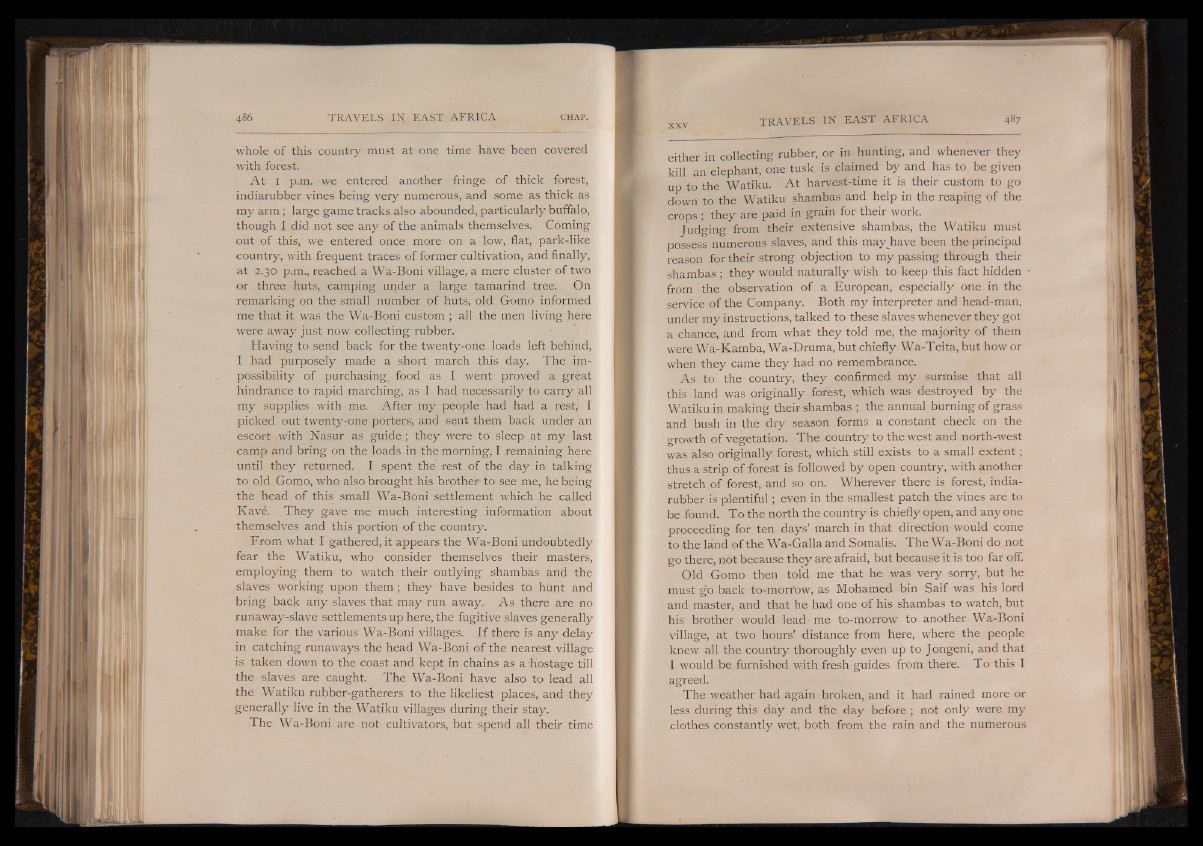
whole of this country must at one time have been covered
with forest.
A t I p.m. we entered another fringe of thick forest,
indiarubber vines being very numerous, and some as thick as
my arm; large game tracks also abounded, particularly buffalo,
though I did not see any of the animals themselves. Coming
out of this, we entered once more on a low, flat, park-like
country, with frequent traces of former cultivation, and finally,
at 2.30 p.m., reached a Wa-Boni village, a mere cluster of two
or three huts, camping under a large tamarind tree. On
remarking on the small number of huts, old Gomo informed
me that it was the Wa-Boni custom ; all the men living here
were away just now collecting rubber.
Having to send back for the twenty-one loads left behind,
I had purposely made a short march this day. The impossibility
of purchasing food as I went proved a great
hindrance to rapid marching, as I had necessarily to carry all
my supplies with me. After my people had had a rest,- I
picked out twenty-one porters', and sent them back under an
escort with Nasur as guide; they were to sleep at my last
camp and bring on the loads in the morning, I remaining here
until they returned. I spent the rest of the day in talking
to old Gomo, who also brought his brother to see me, he being
the head of this small Wa-Boni settlement which he called
Kave. They gave me much interesting information about
themselves and this portion of the country.
From what I gathered, it appears the Wa-Boni undoubtedly
fear the Watiku, who consider themselves their masters,
employing them to watch their outlying shambas and the
slaves working upon them; they have besides to hunt and
bring back any slaves that may run away. As there are no
runaway-slave settlements up here, the fugitive slaves generally
make for the various Wa-Boni villages. If there is any delay
in catching runaways the head Wa-Boni of the nearest village
is taken down to the coast and kept in chains as a hostage till
the slaves are caught. The Wa-Boni have also to lead all
the Watiku rubber-gatherers to the likeliest places, and they
generally live in the Watiku villages during their stay.
The Wa-Boni are not cultivators, but spend all their time
either in collecting rubber, or in hunting, and whenever they
kill an elephant, one tusk is claimed by and has to be given
up to the Watiku. ' At harvest-time it is their custom to go
down to the Watiku shambas and help in the reaping of the
crops ; they are paid in grain for their work.
Judging from their extensive shambas, the Watiku must
possess numerous slaves, and this mayjiave been the principal
reason for their strong objection to my passing through their
shambas ; they would naturally wish to keep this fact hidden
from the observation of a European, especially one in the
service of the Company. Both my interpreter and head-man,
under my instructions, talked to these slaves whenever they got
a chance, and from what they told me, the majority of them
were Wa-Kamba, Wa-Druma, but chiefly Wa-Teita, but how or
when they came they had no remembrance.
As to the country, they confirmed my surmise that all
this land was originally forest, which was destroyed by the
Watiku in making their shambas ; the annual burning of grass
and bush in the dry season forms a constant check on the
growth of vegetation. The country to the west and north-west
was also originally forest, which still exists to a small extent;
thus a strip of forest is followed by open country, with another
stretch of forest, and so on. Wherever there is forest, india-
rubber is plentiful; even in the smallest patch the vines are to
be found. To the north the country is chiefly open, and anyone
proceeding for ten days’ march in that direction would come
to the land of the Wa-Galla and Somalis. The Wa-Boni do not
go there, not because they are afraid, but because it is too far off.
Old Gomo then told me that he was very sorry, but he
must go back to-morfow, as Mohamed bin Saif was his lord
and master, and that he had one of his shambas to watch, but
his brother would lead - me to-morrow to another Wa-Boni
village, at two hours’ distance from here, where the people
knew all the country thoroughly even up to Jongeni, and that
I would be furnished with fresh guides from there. To this I
agreed.
The weather had again broken, and it had rained more 01-
less during this day and the day before j not only were my
clothes constantly wet, both from the rain and the numerous